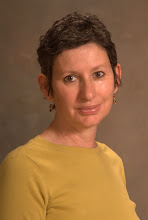You recognize them by their grey hair and burgundy blazers. George Bush (the first) would have praised them as glimmers among his 1,000 points of light. They are the legions of hospital volunteers, who donate their time and good cheer to foster our better health.
These good Samaritans play a visible role in cancer treatment. During chemo, I noticed the same woman volunteering every time I was there. She brought pillows and blankets to the patients hooked to IVs, chatted with family members, and assisted the nurses in small ways.
The radiation technicians and doctors rely on volunteers, too. Bill, a courtly gentleman in his late seventies, is at the hospital four mornings a week to assist with the radiation process. Because radiation is a daily occurrence, it's hard not to know Bill. He sits in the "gowned" waiting room, which is where patients, dressed in hospital robes, wait their turn to lie under the beams. Bill learns all the patients' names and gleans little tidbits about their lives -- whether or not they have children, where they work, what they're reading, etc. By doing this, everyone sitting nearby also learns a little something about the others being treated. Thus, Bill breaks the ice and creates a social network among the patients.
Bill also helps the technicians by escorting patients to and from the treatment rooms, or to the examination rooms on the days when they see the radiation oncologist. I don't know what Bill did before he retired and became a hospital volunteer. He's a natural at creating a welcoming environment and helping people to relax.
Those who prefer to keep to themselves in a hospital setting may wince at the idea of Bill facilitating conversation among strangers in a waiting room. But Bill's efforts are a good thing, because the whole process of cancer treatment wears people down. Exposure to his kindness, which he dispenses regularly and without pay, is uplifting, really.
I had a less than kind moment myself the other day, and since confession is good for the soul, let me get this out. I was in the bank parking lot about to get back into my car when a woman passed by me and said, "I like your hair." Since I'm now sporting a credible likeness to Sinead O'Connor, I was taken aback for a beat and paused before responding, "It's the chemo. This my post-cancer look." Hearing this, the woman visibly drew in a breath and was clearly stunned. I finished off the moment by saying, "Thanks, it's starting to grow back," before getting into the car.
Later, I thought about my reaction. I could have just said, "Thanks," and skipped the explanatory language. Perhaps my gut instinct was that her words were insincere, although in retrospect I doubt that was the case. I think now that she was applauding my boldness. So I'm chalking this experience up to my being a little slow on the learning curve and not being fully comfortable in my own skin yet. The next time someone makes a comment, however, I'll be better able to respond.
I have the example of Bill and the other hospital volunteers who dispense so much caring each day. They've taken the bumper sticker notion of committing random acts of kindness and incorporated it into their daily routines. Here's to the folks in the burgundy blazers.
6/22/08
Subscribe to:
Post Comments (Atom)





1 comment:
I take your point. But I applaud the straightforwardness of what you said, especially in light of your next post, about the sheer numbers of women dealing with breast cancer, and the fact that people all around us are dealing with all kinds of cancer. Your comment opened the closet door a crack and shined some light in. I think random exchanges raise awareness and serve to destigmatize the illness and treatment a bit. Of course there are other ways of accomplishing those goals, but the occasional word on the fly works, too.
Post a Comment